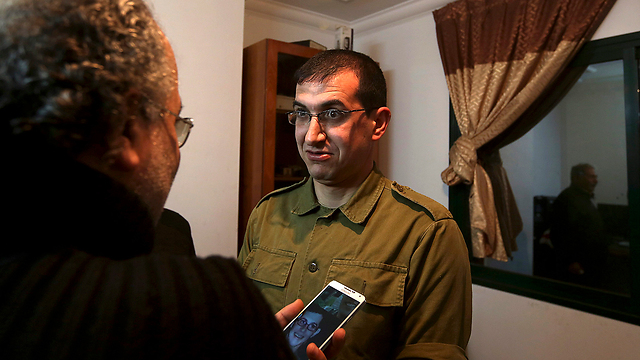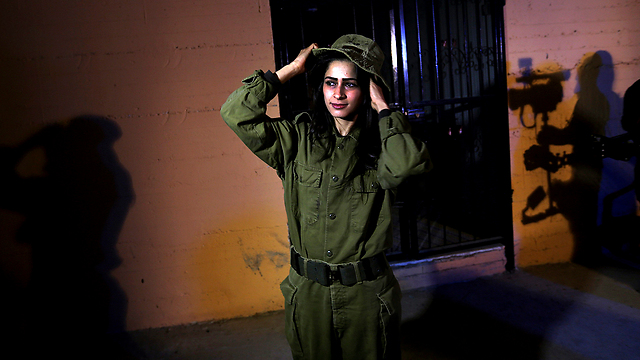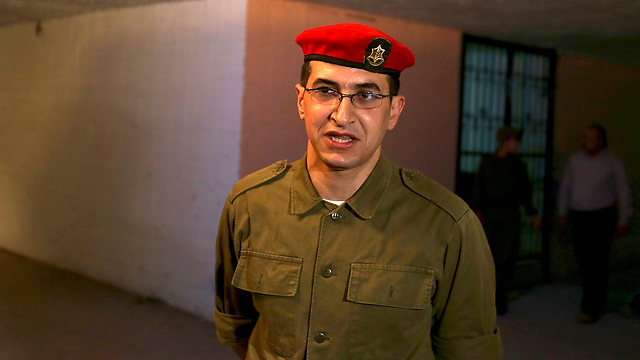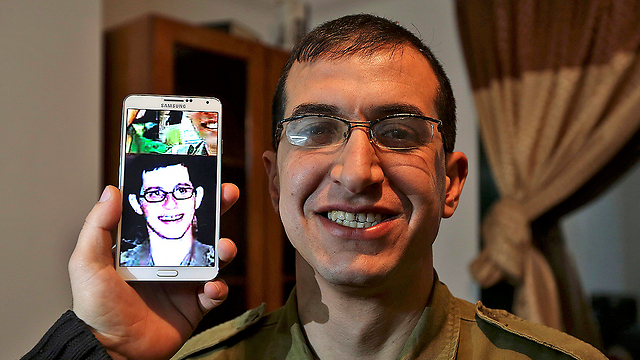
Gaza's 2nd feature film to focus on Shalit capture
'Losing Shalit,' second feature-length film made in Gaza Strip since 2009, focuses on 2006 capture of Israeli soldier Gilad Shalit by Hamas
Gaza's tiny movie industry may struggle with amateur actors and power outages, but at least it has a winning formula of which the producers never seem to tire: the heroics, from a Palestinian perspective, of those fighting Israeli occupation.
"Losing Shalit" will be the second feature-length film made in the blockaded territory since 2009. It's the first of a planned three-part series about the 2006 capture of Israeli soldier Gilad Shalit by gunmen allied with the Hamas movement. It's currently in production and parts two and three will depict Shalit's time in captivity and his 2011 swap for hundreds of Palestinian prisoners held by Israel.
Like the first Gaza film, about a senior militant commander, it received financing from the Hamas government. The Shalit capture and eventual prisoner swap are seen by Hamas as a triumph in its long-running confrontation with Israel, and helped boost the movement's support in Gaza.
Writer-director Majed Jundiyeh, who also made the territory's first full-length feature "Emad Akel" – a 2009 film about the Hamas military wing commander of the same name – said his work is intentionally political. "I'm working to establish a movie industry of resistance in Gaza, to reflect the Palestinian story with Palestinian actors," he said.
Jundiyeh, 47, studied film in Germany in the 1980s and 1990s and said his teachers included director Volker Schloendorff, a prominent member of the New German Cinema. After his return to Gaza in 1996, Jundiyeh made documentaries and acted in a soap opera on Palestine TV.
Since the Emad Akel movie, filmmakers in Gaza have produced several documentaries and short films, but making full-length movies remains a challenge. Gaza has suffered from border blockades by neighboring Egypt and Israel since Hamas seized the territory in a violent takeover in 2007. Egypt tightened its border closure several months ago, exacerbating daily power cuts.
Jundiyeh said he contends with funding shortages, lack of equipment and crews without technical expertise. The Culture Ministry in Gaza is financing the Shalit movie, along with contributions from a local production company, al-Wataniya, and Jundiyeh himself, according to al-Wataniya.
In an added difficulty, most of the dialogue in the 105-minute "Losing Shalit" is in Hebrew, a language most of the dozens of amateur actors don't speak.
That includes Mahmoud Karira, a 27-year-old Gaza firefighter who was chosen for the Shalit role because of his resemblance to the lanky, bespectacled Israeli soldier.
"It's very hard for me to speak Hebrew," said Karira, who has eight lines. Karira said he repeats each line dozens of times before each shoot, but that some of the scenes require several takes.
On Wednesday, the crew shot in the underground parking garage of a Gaza building that also houses the al-Wataniya company. In the movie, it's meant to be the garage of a building housing Israel's Shin Bet security service, which is in charge of interrogating Palestinians suspected of anti-Israeli activities and in the past used methods critics say amounted to abuse.
In Wednesday's scene, Jundiyeh played a Shin Bet officer nicknamed "Abu Daoud," while Fayka al-Najar, a 20-year-old management student, portrayed an Israeli prison guard called Aliza. In the scene, the two chatted in Hebrew, discussing the torture of Palestinian prisoners as they walked to their car.
The scene was shot 40 times because of frequent power outages and because al-Najar fumbled her Hebrew lines.
Al-Najar was cast after answering a newspaper ad. She previously appeared in several short films by female directors about women's issues. She said she agreed to play an Israeli soldier because she wanted to highlight the suffering of Palestinian prisoners, noting that her father spent years in Israeli jails.
Israel has imprisoned tens of thousands of Palestinians for alleged political violence since capturing the West Bank, Gaza and east Jerusalem in 1967.
Palestinian politics is dominated by two camps -- backers of Palestinian President Mahmoud Abbas who seeks a state in the lands captured by Israel in 1967 and supporters of Hamas, which wants to set up an Islamic state between the Mediterranean and the Jordan River, including in what is now Israel.
Jundiyeh said he needs at least $120,000 for the first Shalit movie, but that the budget could swell to $350,000. He was evasive about sources of funding.
An official in the Culture Ministry said the Gaza government contributed $95,000. The official spoke on condition of anonymity because the ministry has not issued a press release about the film.
Despite the Gaza government's support, Jundiyeh said he is independent.
"I'm not Hamas," he said. "I'm a Palestinian who is proud of his people and national struggle."
Jundiyeh said he would also like to make movies about the life of Yasser Arafat, the late Palestinian leader, but that he is hampered by lack of funding and Israeli travel bans that prevent him and many other Gaza residents from crossing through Israel into the West Bank.
"I decided to work on what is available (in Gaza), which is also a very important chapter in our life," he said.














